James writing about optimistic practices. The title arrives in my inbox and I follow the link eagerly. Optimistic practices? Yes please, I need those! But it turns out they’re just the same old things — writing, reading, basic civic engagement. What did I expect?
Mo coming home from his ceramics conference so happy, so totally lit up. Pulling up “mind blowing” pots on his phone to show us. I feel myself caught on the current of his enthusiasm, more wowed than I would ever normally be by these perfectly nice cups and bowls. I often think of Mo when I think of Octavia Butler’s phrase positive obsession. He seems to give into it fully, whereas I spend so much time worrying about whether something is objectively good, objectively the right choice, worth the time, worth obsessing over.
The book I’m reading, when the author gets her diagnosis, and starts writing her first novel. She had assumed she would write a book when she was older and more experienced. But “I didn’t have time to fix myself,” she says. This is the second memoir I’ve chosen to read recently about women with lifelong chronic illnesses. What’s that about?
That quote from James’s essay, what was it? “Pessimism of the mind, optimism of the will.” Had to go back to find it. Maybe I liked the essay after all.
Kaveh Akbar writing in The Nation, his essay baldly titled “What Will You Do?” The clear implication that him sitting down to write this essay goes in the category of doing something. Which, because of the size of his audience, I suppose it does. It’s just that it pings against my ongoing, personal confusion about when writing is action.
Symantha, my boss, flying into a rage about some anti-Palestinian, anti-student-protestor shit that one of the wine importers we work with says on instagram. She tapes a sign to the front door of the bar, using the paper we use to print menus. At a distance, it looks like one of those signs you put up to say, “our hours have changed…” I imagine people slowing down to read it, and instead seeing “Free Mahmoud Khalil.”
I visit my dad and we watercolor the amaryllis that is about to bloom. He does his every year, often multiple times, over the course of its opening. I have no idea how many amaryllis watercolors he has at this point.
Akbar quotes another poet saying, “& so to tenderness I add my action.” Like the phrase optimistic practices, this seems like a doorway I want to walk through. I google the poem the line is from. It seems to be about childbirth; to be honest I skim it after the first third, once I realize it’s not resonating with the things I’m trying to think about right now.
In workshop, Edu asks for advice on revising his work. Kyle says he mostly just reads his play over and over. (Gotta love the simplicity of a poet’s approach sometimes.) If somethings sounds wrong he takes it out. He likes to be ruthless, he says, because that’s how you “boil it down.”
The concern, for myself, is the difference between an optimistic practice and clinging to normalcy. Especially when it comes to writing — to devoting my time to writing — does this represent an optimism for the collective? Or just an insistence that things are okay enough for me to continue with my own little goals, unhindered?
Mo has built a successful career and a national reputation for himself as an organizer for racial and economic justice. In the past few months, he’s seen years of organizing wins dismantled. Now what he mostly wants to do is make pots.
I’m always chasing the simplicity of impulse translated to action, no interference. The catastrophy of illness seems to be one way to get that permission, to bypass self-doubt, perfectionism, uncertainty. But I’m not ill, thankfully. So why do I think I can learn to do that by reading these writers who are?
It goes back to this word practice. You don’t have to feel a thing to practice it. You don’t have to feel inspired to write. You don’t have to believe your actions will make a difference to do them. Is this true? Can the state “pessimism of the mind, optimism of the will” actually be sustained? Or will one outlook eventually win over?
Of course it is action. Bizarre for me to even ask whether words are action, when the activists Akbar is writing about are essentially being disappeared for their words.
It’s a small risk, but it’s a risk nonetheless. There could be people who react badly to the sign, who choose not to come to the bar, who think keeping your views to yourself is a requisite part of business-owner respectability politics. Symantha’s risk is smaller than Akbar’s, who is writing publicly as a Muslim and an immigrant. But still, there’s something on the line. Did she hesitate between impulse and action? If she did, I didn’t see it.
Amaryllis-painting seems like an optimistic practice, but optimism about what I’m not sure. Perhaps it’s a celebratory practice — less future-oriented, more about the here and now. A way of spending time with beauty. Or if adrienne maree brown is telling the truth when she says what you pay attention to grows, then maybe the wager is that the beauty in the world will not disappear as long as we keep paying it attention. (Is attention action?)
Akbar quotes Girmay, James quotes Gramsci, I quote them both and more. Are we all just sitting around on the internet trying to find another writer who said it better? Or is this what you call a conversation? The internet exaggerates what literature has always done: allowing us to bend time and space to talk to each other. I barely know James; he used to date my friend and I hung out with him once at a wedding.
Sugaring season just ended, so boiling was already on my mind. My housemate tapped our maple trees; shocking how many gallons will come out of a tree in just a few days. And that’s just what the tree can spare, the opening of a single vein. I didn’t know the raw material would be so dilute — it’s just faintly sweet water.
If the future arrives through accumulation, then I guess an optimistic practice is simply one that acknowledges itself as the raw material of the future. If my writing feels unrelated to a liberatory future, then the question is not why is writing my practice. The question is what about that future do I feel disconnected from.
No one can actually tell you what’s worth spending your time on. Even in hindsight, is there ever an answer? In this case, maybe obsession is as good a guide as any. Obsession has power behind it, and power is something we need right now.
Plenty of people get ill and don’t write books. So maybe I could not get ill and still choose to abandon perfectionism and self-doubt.
I always feel better after I write. I spend so much time feeling that I can’t do it, don’t know how to do it, am not doing it well enough. And then the miracle of sitting down and just doing it. Pessimism of the mind, optimism of the will.
I guess Akbar will never know if anybody decides to take action because they read his essay. What if nobody does? What if ten people read it and mistake feeling for action? What if twenty people read it and take action and none of their actions have the desired result? I guess that’s not his business. His business was taking the risk in front of him.
Symantha, too, took her risk through language. She wrote a short poem on the door.
What is the risk of painting the amaryllis? That you won’t capture it. That you will fail in the face of its beauty. But you know that when you start.
I’m feeling the impulse to quote yet another writer here, but I think that would be excessive. Or would it be conversation?
I like this boiling-down thing as a way to approach clarity without sacrificing polyphony. The clean forms we’ve been taught — the five paragraph essay, the rising and falling action of a character arc — they don’t seem that useful for capturing the way my brain feels these days.
Their predictable structure has little to do with mental overstimulation, internet saturation, and day after day of bad news. Like the sap, it runs and runs, too dilute to make sense of. Can boiling-down be a different way to arrive at at thesis, albeit a differently shaped one? Or are clarity and polyphony inherently at odds — must one win out?
1. The whole reason the phrase optimistic practice appeals to me is that practice is finite in a way thought or language is not.
5. Still, when I am desperate to get out of my head and do something, I find myself seeking guidance in words.
4. I feel better after I write; I don’t feel better after I just think about writing. Proof of how writing sits strangely at the intersection between action and inaction.
6. She continues to revise the poem:
1.
2.
3.
4.
5.
6.
8. “Tenderness does not choose its own uses. It goes out to everything equally, circling rabbit and hawk. Look: in the iron bucket, a single nail, a single ruby — all the heavens and hells. They rattle in the heart and make one sound.”
7. Where do Mahmoud’s detention and the opening of the amaryllis intersect?
9.
1. What if an optimistic practice is one that erodes the space between impulse and action?
2.
3.
4.
5.
6.
7.
8.
9.
Tenderness does not choose its own uses
& so to tenderness I add my action
it turns out they’re just the same old practices — reading, writing, basic civic
what did I expect?
& so to tenderness
I add my obsession
It’s a small one, but a risk nonetheless.
No one can tell you what’s worth spending your time on
If she hesitated between impulse and action, I didn’t see it.
Citations:
James Yeh in Writing Co-Lab’s 100 Days of Creative Resistance
Sophie Strand - The Body is a Doorway
Antonio Gramsci - “pessimism of the mind, optimism of the will”
Kaveh Akbar in the Nation
“Late Prayer” — Jane Hirshfield
Dave Ulrey for the amaryllis paintings

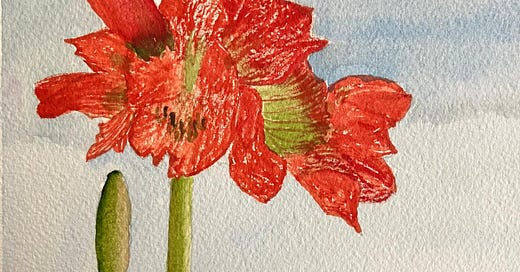


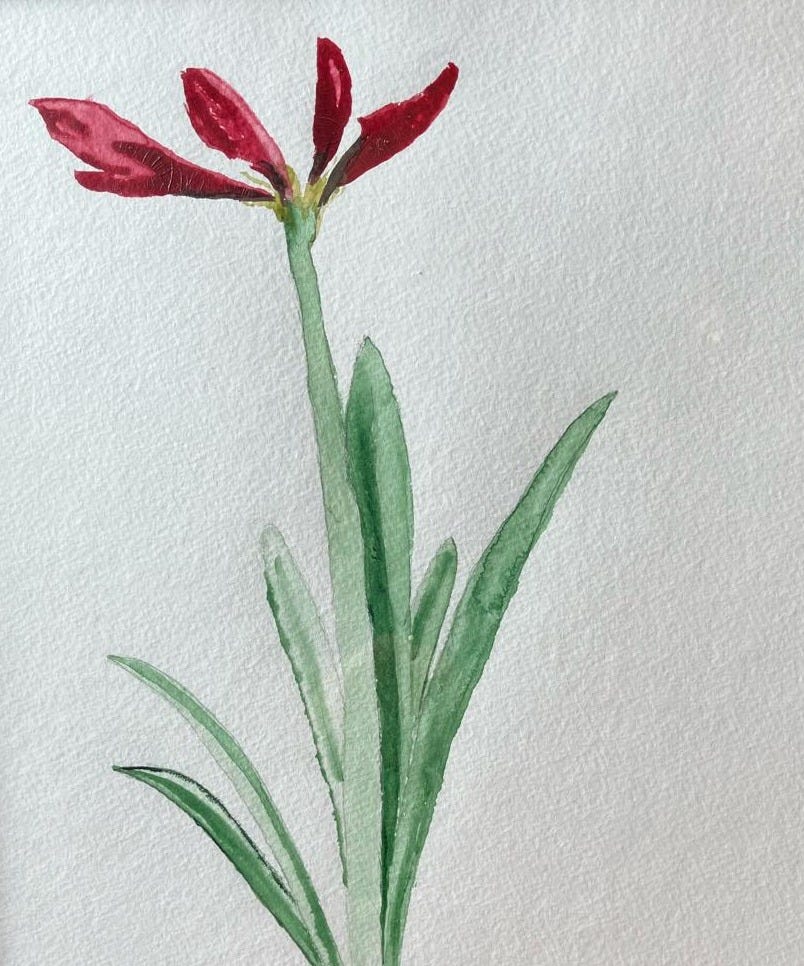

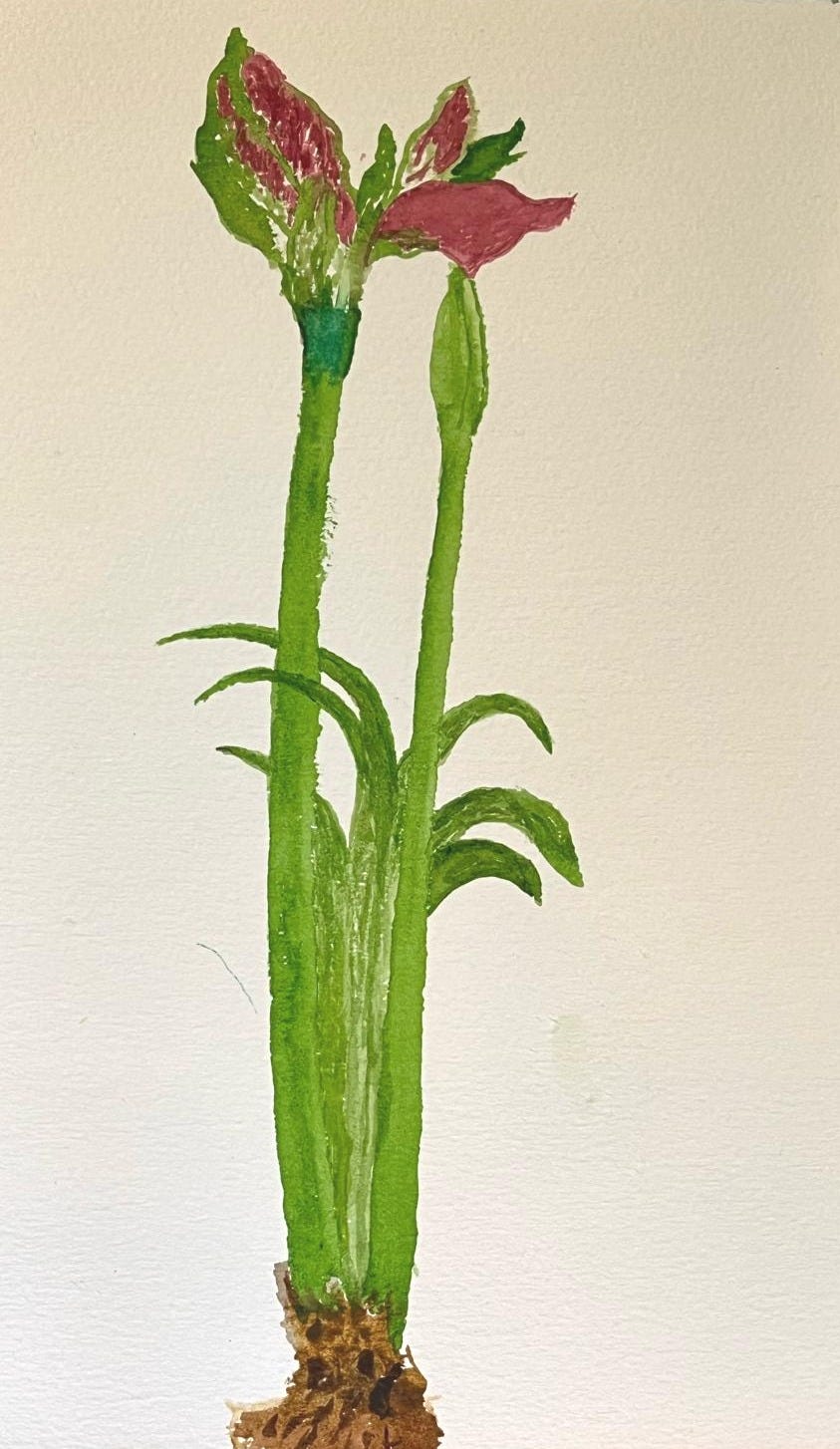
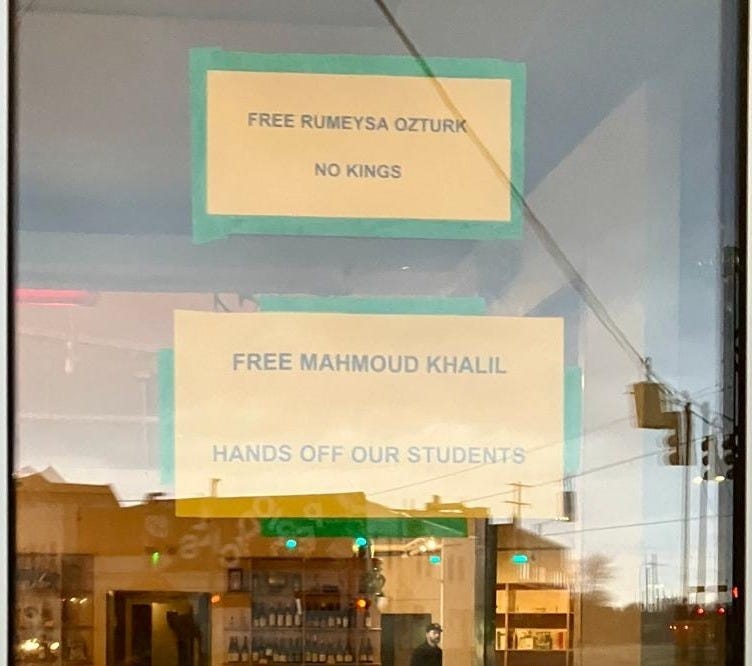
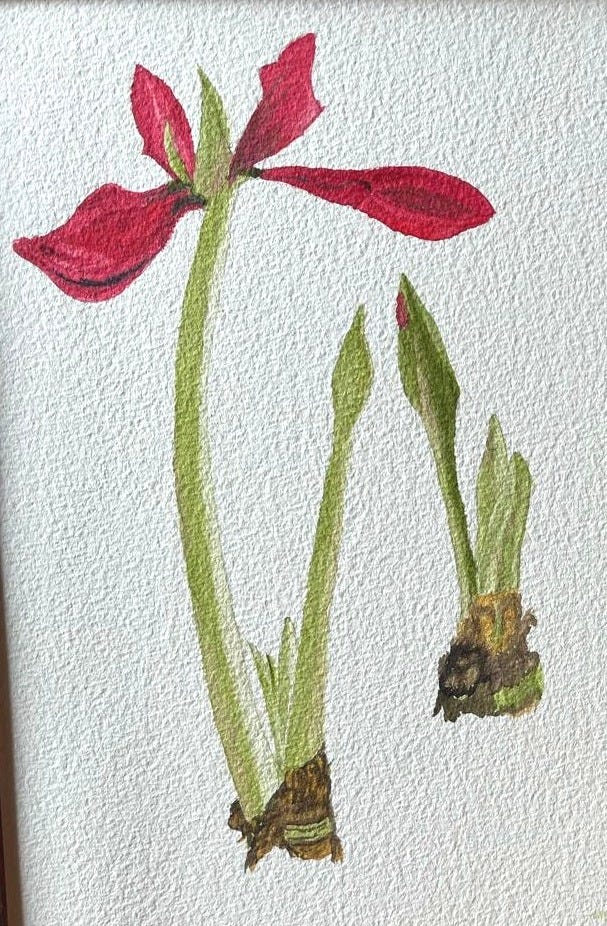
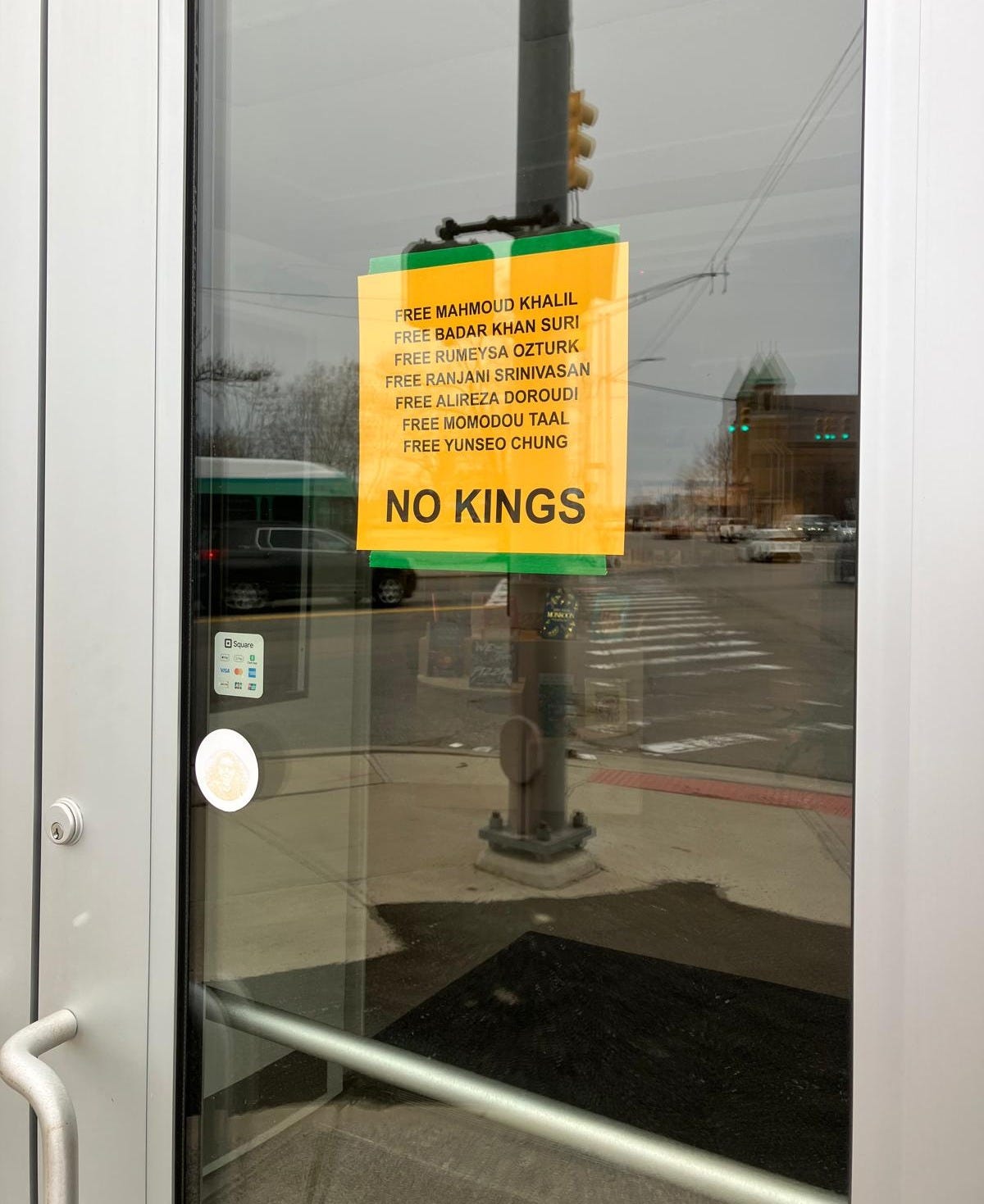

"If the future arrives through accumulation, then I guess an optimistic practice is simply one that acknowledges itself as the raw material of the future." Thank you, I love this.
I think a lot about Lou Sullivan's frenzy of creative output after his AIDS diagnosis. About how imminent death took the filter off. About what my own filters are holding me back from, and what worlds they're stopping me from building.